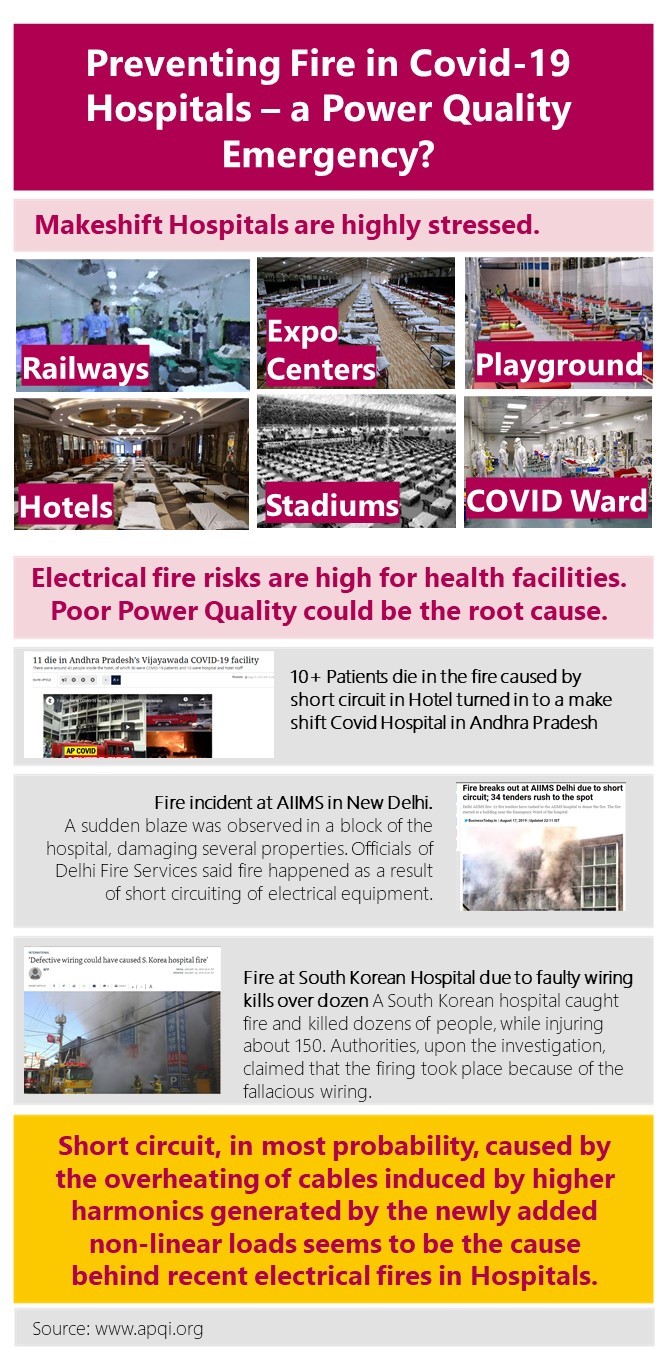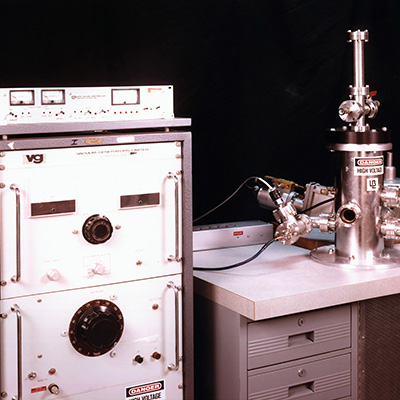Published On: Nov 05, 2020
A series of frequent and unfortunate fire incidents in COVID Hospitals is a cause of concern. The COVID emergency is not going away soon and all the emergency infrastructure built to fight COVID-19 may now fall flat on its face given its weak foundation. Power Systems are particularly vulnerable given the sudden increase in non-linear loads comprising of ventilators and related medical devices – a crucial defense aid in fighting COVID. With improper electrical systems, further marred by poor electrical standards and workmanship, hospitals are staring at the high risk of poor PQ weakening the immune systems of their electrical facility and leading to fire that they cannot afford!
INTRODUCTION
If courage is contagious, ignorance is pandemic!
The world is facing one of the most unfortunate events in the form of Covid-19 after Spanish flu century back. Resources including healthcare, finance, industries, and governmental systems are all put on a constant drive to lessen the impact of the coronavirus. The Covid-19 pandemic has put a stress on the Hospitals like never before. Almost unprepared for the scale and nature of COVID’s medical emergency, it is natural for the Hospital’s managers to prioritize the most urgent and important – treatment of patients. But often amongst all the essential tasks, the minor ones generally get the least priority and lead to trouble later. It is therefore obvious that the poor PQ and electrical safety issues are bound to receive less attention in a situation where there are patients struggling for life. But at the same time, it must not be ignored that these seemingly minor electrical issues have also taken a severe turn and caused fire in the establishments. More importantly, these cannot be dislodged as one-time exceptions, and a closer look will clearly highlight the pattern and the nature of risks looming over the Hospitals.
PROTECTING COVID HOSPITALS/ MAKE SHIFT HOSPITALS FROM FAILURE
Hospitals have been tirelessly operating in the pandemic, constantly stressed for resources including space, medication and care. And as Hospitals ran out of these, city after city have built large make-shift hospital facilities. From sports stadiums to hotels, a variety of facilities are being turned into make-shift healthcare facilities. Given the large scale of the problem and short availability of time and resources, very little can be assured for standards and underlying quality of work for the electrical systems. This only means, the risks to safety and reliability of power systems is higher than ever before. While the heroic effort of China’s agencies building a multi-storied hospital in less than 30 days is something to follow, the fact that it could survive and fulfil its function in a safe and reliable manner must also not be forgotten in aiming for similar solutions.
While the doctors, nurses, medical professionals, and researchers are working day and night, providing utmost care to the COVID-19 patients, the risks are not restricted to COVID alone. Hospitals are up against yet another hectic and exhausting challenge – ensuring uptime, safety and proper functioning of all critical devices and systems, mostly driven by electricity, in an extremely challenging situation. Any technical difficulty can become overwhelming for the hospital facility in such a stressed situation. A strong indication of the stressed and crumbling systems is the events of electrical fires in recent times in the hospital facilities that were dedicated to COVID treatment.
As Hospitals protect patients form COVID, it is now evident from certain incidents of fire that the Hospitals itself need better and proactive protection from the risks to reliability and safety of the facility.
HOSPITAL FIRES – THE UNDERLYING ELECTRICAL POWER QUALITY ISSUES CANNOT BE IGNORED ANYMORE
Hospital’s critical nature demands extremely careful wiring. Presence of PQ issues such as high harmonics in the electrical system is often the root cause of overheating of cables and equipment, further leading to system failures, and in extreme cases short circuit and instances of fire. This is further accentuated by poor workmanship or poor quality of electrical hardware being deployed under time and financial stress.
As Hospitals continually equip themselves to serve more patients, reliable electrical supply must be ensured for seamless and safe functioning of the facility. Addition of new loads, whether its ventilators or converting the basement to a make-shift healthcare facility, a thorough assessment to check the preparedness of existing electrical system to function in a safe and reliable manner should always be the first priority. From minor voltage or current disturbances to emergence of a previously undetected poor grounding issue, PQ issues can lead to a spike in risks to the facility that Hospitals may not be in a position to control swiftly.
With the addition of Ventilators, air-conditioners, high-capacity machines in the Intensive Care Units, testing facilities for COVID, addition of more rooms, and increased use of flammable alcohol based sanitizers or PPE kits, risks of fire are only going higher. Add to it the poorly designed power systems built with even poorer workmanship, it all works like oxygen to start an electrical fire and feed it further.
FIRE IN COVID HOSPITALS – A CLEAR GLOBAL PATTERN
|
Here are the news reports from recent times that highlight the nature of fire in COVID hospitals, its root causes and the damage to life and the serving facility: Fire due to poor safety in electrical supply in Gujarat Hospital kills 8 patientsAs reported by the Times of India, a hospital in Gandhinagar, Gujarat, caught fire, killing 8 COVID-19 patients. The system check by the chief electrical inspector revealed that the fire took place due to the poor condition and safety of electrical supply. The inspection also found out that a majority of 76% hospitals were equipped with faulty wiring and thus show overloading issues. These system issues put the overall electrical system of the hospital at risk. The ratio of defective wiring in the hospitals is quite startling. The office of the chief electrical officer inspected the sum of 364 COVID hospitals, out of which 230 were found to have defective wiring and other electrical supply problems, and 50 hospitals had electrical overloading issues. Facing such complications during pandemic is severe and unwanted. 10+ Patients die in the fire caused by short circuit in Hotel turned in to a make shift COVID Hospital in Andhra PradeshAt least 10 patients have died after a fire at a temporary COVID hospital in Vijayawada, south-east India. The fire broke out at Swarna Palace, a hotel being used to house patients, on Sunday morning. Source:https://news.yahoo.com/vijayawada-fire-covid-facility-india-063419053.html Fire at Women’s Hospital ward in MalaysiaA month ago, similar event was reported in Malaysia. Fire took place in the women’s ward of the Sultanah Aminah Hospital. 26 patients from the ward had to be moved immediately. An inspection of the root cause of the fire was done immediately after the event. Investigators found that the hospital’s building rewiring of the electrical system. There was a similar incident that took place six years ago in the ICU of the same hospital, killing 6 people. After such a damaging event, the healthcare ministry of the Malaysian government set their focus on the nationwide inspection of all hospitals. |
 |
Makeshift COVID Hospitals in Trains in France at high risk of fire
In the month of April, France started preparing trains to treat Covid-19 patients. The reason was not only to make more places available for treatment but to keep patients safe from the fire-prone hospitals. The hospitals are at a great risk of catching fire as most of them have not been provided with precise wiring or electric supply. Little variation in the amount of the power can cause unimaginable consequences.
Fire at South Korean Hospital due to faulty wiring kills over dozen people
A South Korean hospital caught fire and killed dozens of people, while injuring about 150. The affected people were patients as well as the hospital’s medical staff. Authorities, upon the investigation, claimed that the firing took place because of the fallacious wiring.
Fire at AIIMS due to short circuit
Hindustan Times reported a similar hospital fire incident that occurred at AIIMS in New Delhi. A sudden blaze was observed in a block of the hospital, damaging several properties. Officials of Delhi Fire Services said that the fire happened as a result of short circuiting of electrical equipment.
Faulty AC wiring leads to fire at a Hospital in Malaysia
Another fire incident shocked the staff in Sarawak, Malaysia, last year. The fire department had to take out many injured patients as the blaze spread through the hospital. Officials checked the root cause of the fire, which was again a faulty wiring for hospital’s air conditioning. It is often repeated story of HVAC electrical systems getting compromised for safety due to varieties of reasons.
A clear pattern of short circuit, in most probability, caused by the overheating of cables induced by higher harmonics generated by the newly added non-linear loads seems to sum the story behind recent electrical fires.
Hospitals and their electrical systems are of utmost importance regardless of the crisis. Many incidents recorded in the past attribute fire to the faulty wiring system or fluctuations in power. A number of events were recorded from the past, which have, insisted on the inspection and repair of the hospital electrical system from time to time.
FIRE IN COVID HOSPITALS – PREVENTION NOT PROTECTION IS THE KEY
Hospitals that use several non-linear loads and sensitive electronics alongside heavy duty air conditioners and heaters, other large or small medical testing instruments, and are therefore always at the risk of poor power quality. While the first responsibility to ensure compliance to building codes for safety and reliability rests with designers, careful maintenance and monitoring of PQ on an ongoing basis is also important.
Even today, the reactions to all the incidents of fire has been a rapid ordering of fire audit by the respective state Govts.
- Yogi Adityanath orders fire safety survey of COVID hospitals (Read more at: http://timesofindia.indiatimes.com/articleshow/77423955.cms?utm_source=contentofinterest&utm_medium=text&utm_campaign=cppst)
- Bhopal municipal corporation orders fire safety review of hospitals (Read more at: http://timesofindia.indiatimes.com/articleshow/77452602.cms?utm_source=contentofinterest&utm_medium=text&utm_campaign=cppst)
- Odisha Orders Fire Safety Audit Of COVID Hospitals, COVID Care Centers (Read more: https://odishatv.in/odisha-news/odisha-orders-fire-safety-audit-of-covid-hospitals-covid-care-centres-467560)
While a proactive fire audit of the COVID hospitals is a welcome move, these rapid fire audits are testing the ability of the facility to protect itself from the fire, if it were to occur, not prevent the fire.
Given below are a few quick steps to proactively identify the vulnerabilities in power systems and much before they lead to extreme events of electrical fire.
- Power Quality studies along with thermal imaging are highly helpful in understanding the potential overheating in the electrical network.
- Periodic measurements and monitoring of harmonic distortion help in early identification and prevention of the heating in the electrical cables.
- Deteriorating connections can cause voltage sags which are dangerous for the system. A comprehensive power quality study can uncover wiring problems on-the-ground and thus help to avoid fire hazards.
- For sensitive imaging devices or diagnostic equipment using isolation transformer and ensuring effective earthing is mission critical
- In case of non-linear loads, harmonics can raise to high level causing severe out-of-balance conditions. Use of 3+1 core cables is beneficial in such electrical systems to handle the imbalance. 3+1 core cables, owing to their larger surface area, help in reducing the hot spots thereby reducing the risk of electrical fires.
- Triplen Harmonic Filters helps to minimize the electrical fire risks emanating in infrastructure with heavy IT/ITeS, Building Automation with non-linear loads, Computational Infrastructure, UPS Batteries etc.
- Monitoring the power quality regularly and taking required actions on the findings can help in mitigating the fire risk.
PROTECTION FORM FIRE – HIGH TIME FOR PROACTIVE APPROACH TO PQ
Electrical fire in Hospitals is never sudden phenomenon or an accident. In fact, it’s a result of a long-time alarm that has kept ringing but has gone unnoticed in the din of other important priorities. But compromised safety of Hospital facility poses high risks to the reliable conditions for patient care, for COVID and beyond.
A proactive approach to PQ is the only way to ensure a full-proof safety of the electrical systems from instances of fire. Hospitals must invest and upgrade their knowledge and experience in resolving the urgent and growing PQ issues on priority. Proactive prevention of the PQ issues in Hospitals requires much groundwork and addressing the root causes. A course correction from the current practices is required at every stage – from design to installation and maintenance when the facility is in operation. Following high standards and not falling for savings in upfront costs must be the norm.
All the hard work sacrifice and care in saving lives of COVID patients cannot be at the stake of an increased risk of electrical fire from poor PQ issues.
REFERENCES
- Power Quality in Hospitals – https://apqi.org/archives/1765
- France uses Trains for Corona Patients – https://globalnews.ca/news/6781481/france-uses-trains-coronavirus-patients/
- Defective wiring leads to Korea Hospital Fire – https://www.thehindu.com/news/international/defective-wiring-could-have-caused-s-korea-hospital-fire/article22545466.ece
- Overloaded wires and flammable stuff are deadly triffers for fire at Hospitals – https://timesofindia.indiatimes.com/city/delhi/clear-and-present-danger-overloaded-wires-flammable-stuff-are-deadly-triggers/articleshow/70719520.cms
- Patients evacuated after fire at Lawas Hospital – https://www.thestar.com.my/news/nation/2019/09/26/patients-evacuated-after-fire-scare-at-lawas-hospital





